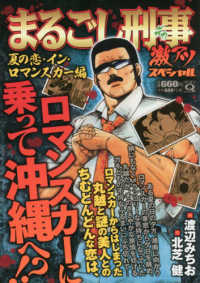Full Description
The volume explores the ways in which the lottery was imagined in early modern and long eighteenth-century Europe. It presents a series of interconnected case studies from Denmark-Norway, the German-speaking areas, Britain, the Low Countries, France, Italy, and Spain, which bring into dialogue a wide range of materials: lottery tickets and advertisements, pamphlets and periodicals, visual art, popular songs, poetry, prose fiction and plays, political, moral, and judicial treatises.
This material suggests how lotteries were perceived as inviting fantasies, dreams, and daydreams; as engendering folly, superstition, and compulsive playing; as leading to social misery, bankruptcy, and suicide; as betraying questions of risk, trust, and fairness; and as being deeply embedded in the political and fi nancial development of an emerging modernity.


![[ in jeder zelle des körpers wohnt ein gedächtnis ] : Gedichte (2023. 224 S. 205 mm)](../images/goods/ar/work/imgdatak/37099/3709981999.jpg)





